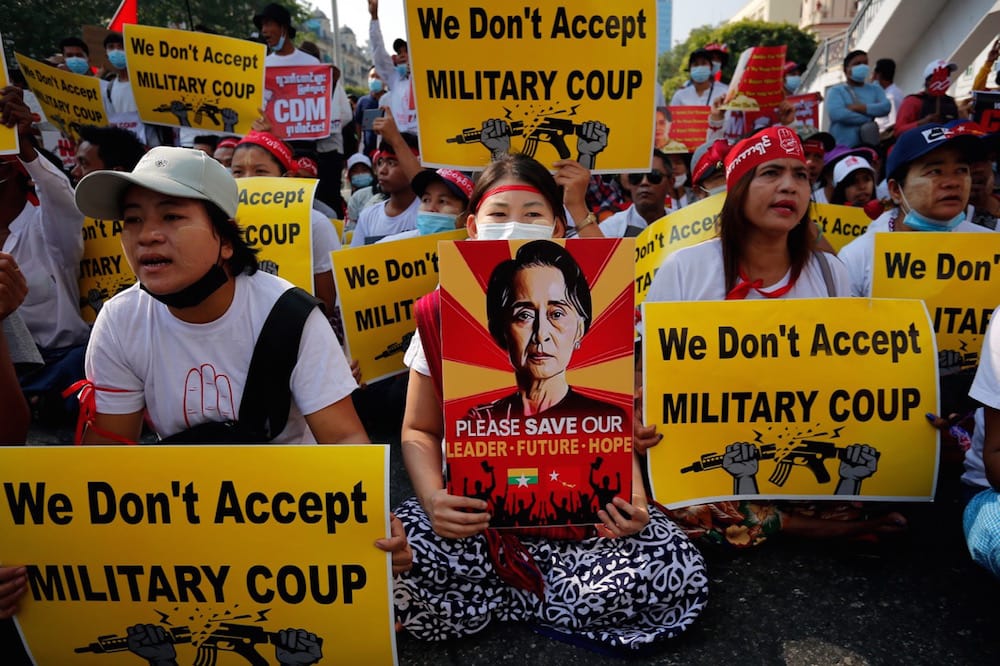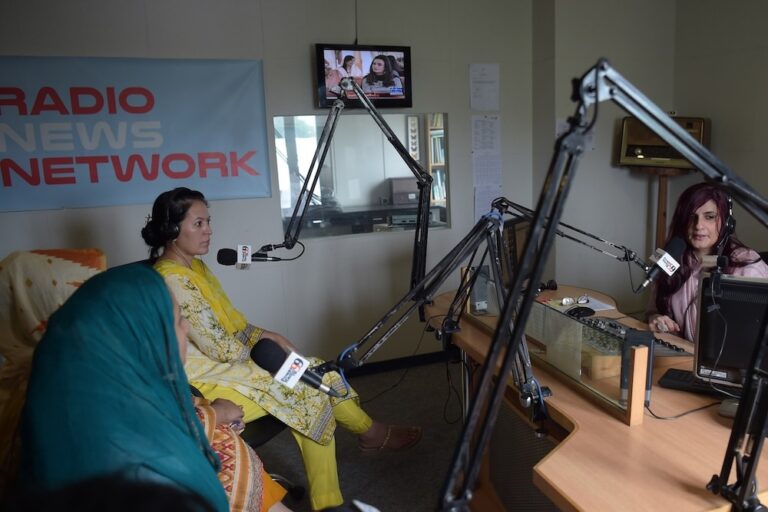February 2021 in Asia-Pacific: A free expression roundup produced by IFEX's regional editor Mong Palatino, based on IFEX member reports and news from the region.
Myanmar’s coup has reversed the country’s democratic transition but citizens are pushing back through a civil disobedience movement. As farmers’ protests gain global attention, Indian authorities are clamping down on journalists and supporters of the movement. A court acquittal in India is a big victory for the #MeToo movement. A Bangladeshi writer dies in prison while a cartoonist fights for his life.
Myanmar coup and civil disobedience movement
Myanmar’s Tatmadaw (armed forces) staged a coup on 1 February which led to the arrest of elected leaders, top officials of the National League for Democracy, and several activists. Internet and communication lines were intermittently disrupted in the past month. The military government has also introduced a cybersecurity bill which critics denounced as draconian for containing measures that would make it easier for authorities to block websites and online content.
Despite a ban on mass gatherings, massive protests have swept the country. A civil disobedience movement has emerged to counter the coup and push for the restoration of democracy. Medical health workers and other government personnel were among the first to challenge the coup.
A general strike on 22 February gathered a record number of citizens who rejected the legitimacy of the new government. At least 18 civilians were killed by security forces on 28 February during a bloody nationwide crackdown on protesters. Hundreds were arrested during the operation, which also targeted several journalists.
This Twitter thread features IFEX members’ statements of solidarity. It links to a statement from independent media outlets, including IFEX member Mizzima News, which responds to a letter from authorities reminding media not to use the terms “coup government”, “military regime”, and “military council”. This was elaborated on, with some grim humour, in an open letter published by Mizzima News:
“Some suggest that if the word “military junta” is not allowed, we should use “power-bandit government”. But at Mizzima, we would like to give you notice that we will continue using the words military council, military regime, coup government and military junta, as necessary.”
India: Censorship, raid, and arrests for covering farmers’ protests
The Indian government has intensified its suppression of information regarding the ongoing farmers’ protests. Journalists, activists, and academics deemed supportive of the protest movement have been harassed, attacked, and even charged with sedition.
Since 28 January, police have initiated at least eight investigations into journalists and media outlets that have covered the protests. The Editors Guild of India has monitored more than 15 instances of attacks against journalists in January.
The Delhi office of news website Newsclick was raided on spurious allegations of money laundering. Reporters Without Borders (RSF) said “this is a political manoeuvre designed to intimidate Newsclick – which has distinguished itself by its coverage of the ongoing farmers’ protests.”
The government also forced Twitter to delete at least 250 accounts belonging to activists, civil society leaders, and media companies that are allegedly spreading misinformation about the protests. Twitter restored the accounts after a few hours. (For more on Big Tech and content moderation issues, globally, check out our recent StoryMap: “Who should control what gets shared over social media?” which features the voices of several IFEX members.)
Authorities arrested 22-year-old Indian climate activist Disha Ravi in Delhi over her alleged role in creating a “protest toolkit” shared online by Swedish activist Greta Thunberg. The Google Document contains information about the farmers’ protests, safety tips for organizing, hashtags, Twitter handles of politicians, and links to petitions. Ravi has denied accusations of sedition. A warrant was also issued for lawyer Nikita Jacob in connection with her alleged role in coordinating the drafting of the document through WhatsApp.
A Bangladeshi writer dies in jail while a detained cartoonist fights for his life
Writer Mushtaq Ahmed briefly appeared in court on 23 February and raised alarms over the deteriorating health of his fellow detainee, cartoonist Ahmed Kabir Kishore. Two days later, Mushtaq Ahmed was hit by a “sudden illness” and died in hospital. His death sparked protests after allegations surfaced that he was tortured in jail.
Mushtaq Ahmed and Ahmed Kabir Kishore were arrested in May 2020 for posting criticism of the government’s pandemic response on Facebook. They were charged under the notorious 2018 Digital Security Act for spreading “propaganda, false or offensive information, and information that could destroy communal harmony and create unrest.”
IFEX member Cartoonists Rights Network International (CRNI) has expressed concern over the weak health of Ahmed Kabir Kishore, who informed his family that he was tortured while in detention. CRNI is among many institutions around the world that have been demanding the immediate humanitarian release of the cartoonist:
“The only question is whether Bangladesh’s government, police, and judiciary will at last do the decent and humane thing and drop the entire case against him, or through their inaction make tacit admission that they are content to risk the death of a cartoonist, a citizen who simply had the temerity to post some drawings on Facebook.”
Women journalists under attack
In China, Australian news presenter Cheng Lei, who has been an anchor and reporter for state media China Global Television Network, was officially arrested on 5 February by Beijing authorities and charged with supplying state secrets to an overseas organization or individual. The Chinese-born Australian had been detained since August 2020.
In the Philippines, RSF is calling for the immediate release of Eastern Vista editor Frenchie Mae Cumpio, an alternative journalist who recently marked her first year in detention on a trumped-up firearms charge. RSF also called attention to the case of Manila Today editor Lady Ann Salem, who remains in detention even though a local judge already dismissed a firearms charge filed by prosecutors. Both Cumpio and Salem are part of the Altermidya network, which is known for its critical reporting on the human rights record of the Duterte government.
In India, PEN Delhi and PEN International are calling on authorities to investigate an attempt on 25 January to break into the house of award-winning journalist Neha Dixit. Since September 2020, the journalist has been receiving phone calls threatening her with rape, acid attacks, and murder.
#MeToo victory
Indian journalist Priya Ramani was acquitted in a criminal defamation case filed by former editor and Minister of State for External Affairs MJ Akbar. In 2018 Ramani accused Akbar of sexual harassment, which inspired at least 15 other women to come forward to share what the former minister had done to them. On 1 February 2021, the court ruled that “the right of reputation cannot be protected at the cost of the right of life and dignity of woman.” The Network of Women in Media, India, said the court decision “offers hope that justice will be delivered to women who speak out, with the dignity and respect they deserve.” Ramani gave a brief message immediately after the verdict:
In brief
A new UN report warns that “Sri Lanka’s current trajectory sets the scene for the recurrence of the policies and practices that gave rise to grave human rights violations.” Reacting to the report, Human Rights Watch pushed for the advancing of “international accountability for grave crimes and acting to prevent further abuses.”
A few days before the UN Human Rights Council session on Sri Lanka, writer Shakthika Sathkumara was acquitted after being charged with propagating hatred and incitement of racial or religious violence for a short story deemed offensive to Buddhism. IFEX member the Free Media Movement (FMM) said, “he has been subjected to terrible injustice, because the police acted arbitrarily in connection with a random complaint received against a short story posted on his Facebook page.”
The BBC was banned by Chinese regulators for alleged breaking of rules on truth and impartiality. This took place a week after Chinese state broadcaster CGTN was stripped of its license in the UK. Index on Censorship has linked the BBC ban to an ongoing crackdown on foreign media outlets in China.
Finally, Facebook has resumed publishing Australian news stories on its platform after briefly blocking content in protest to the News Media Bargaining Code which would require tech companies to pay for the news content they are using. Facebook reversed its decision as part of its negotiations with the Australian government. The Media, Entertainment & Arts Alliance said any deal should not leave out small publishers. “It shouldn’t be up to Facebook and Google to cherry pick and groom publishers it deems acceptable for side deals. Any code should be mandatory, uniform, predictable, and fair; not at the whim of technology executives.”



